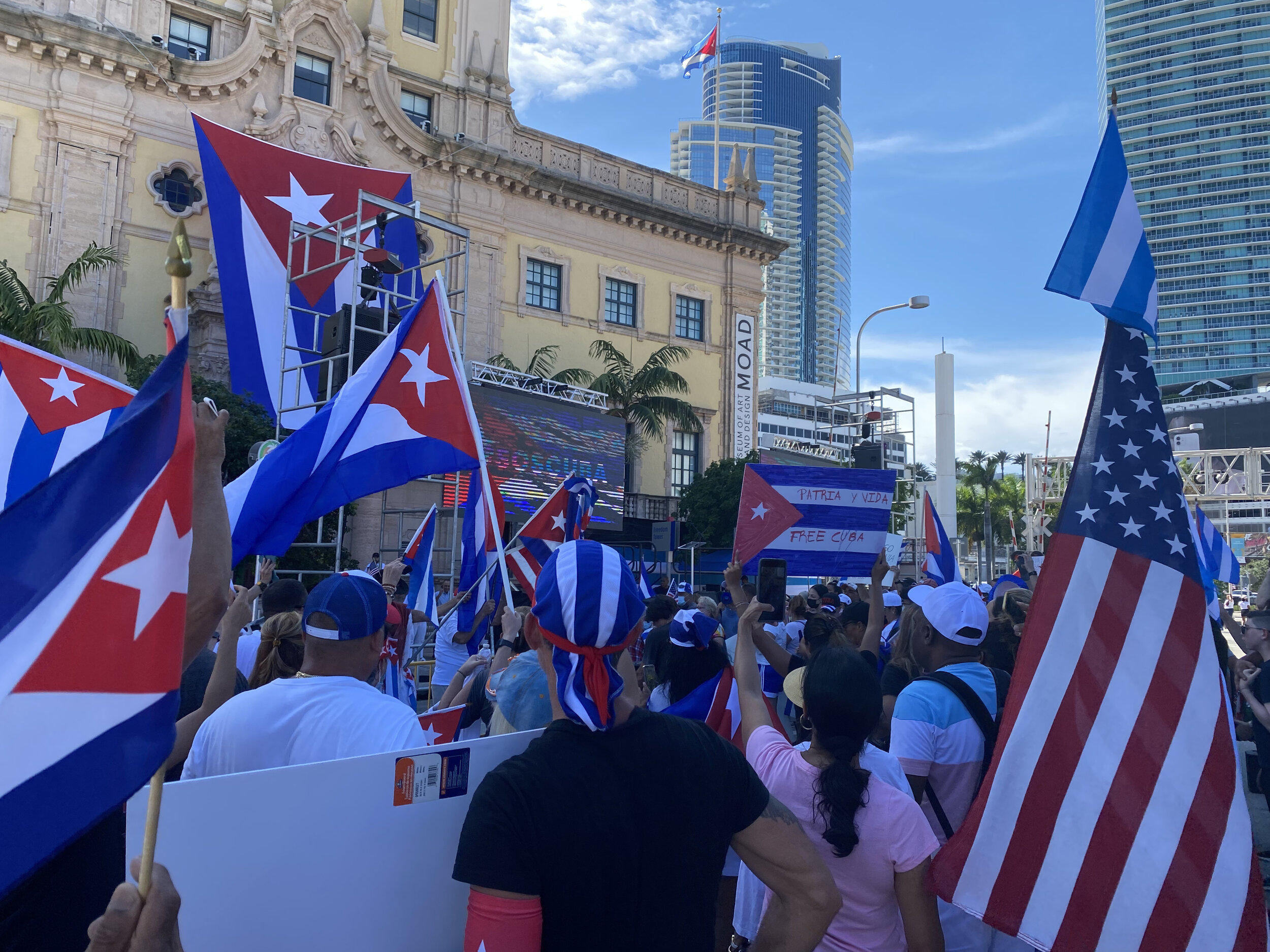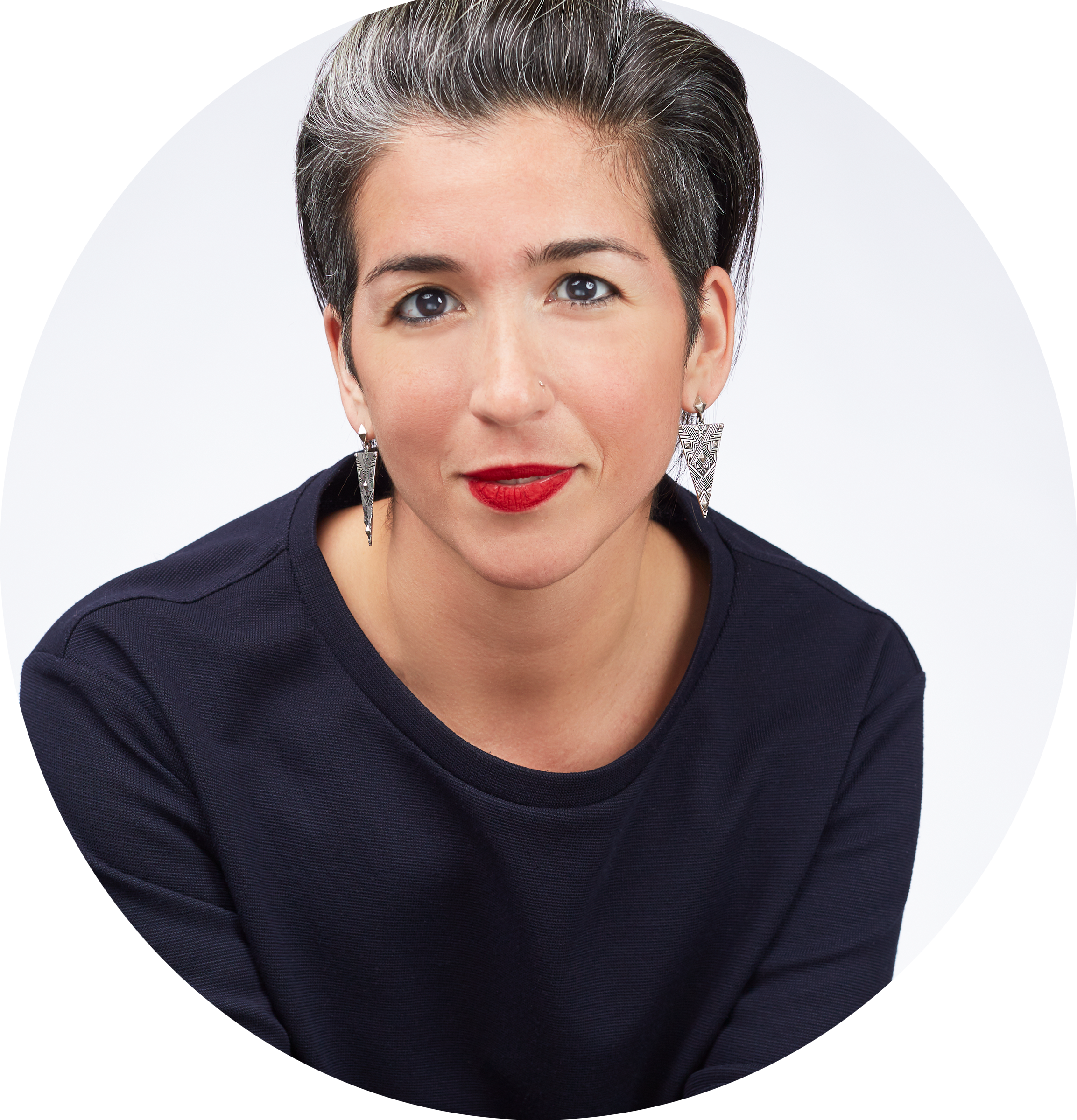My Pen Echoes Cuba’s Chant for Freedom. I am the Bridge.
Protest at Miami’s Freedom Tower. Photo: Vanessa Garcia
All my life, I’ve belonged to the water. To the space between two countries—Cuba and the United States. That place, which, on some maps, is referred to as Miami, though the place I am referring to is more fluid still.
I want to make sure I am being clear. This is not some reference to a muddled or slippery hybrid identity. I am not referring to the hyphen as a tug of war between cultures. I am not torn or confused. I embrace my cultural multiplicity and the ways in which it creates my singularity of purpose. I am an American Born Cuban (ABC) writer, and my writing is a suspension bridge as it tells the story of my people.
I am being both literal and figurative. Right now, as the people of Cuba throw themselves to the street and ask for liberty, I am called to be their echo across water.
My people have hit the streets of our island, protesting against a 62 year old-dictatorship, one that they have been trying to throw from their backs for six decades. The price is high. For many it will mean death, the tearing up of families, the beating down of bodies.
As a result of massive country-wide protests on July 11th, the dictatorship, through its mouthpiece, Miguel Diaz-Canel, has called for violence in the form of police brutality against its own people, murder: democide.
It is my responsibility to amplify the voice of those living on the island. Those whose internet is being cut off intentionally, in an attempt to silence the Cuban people once more. Still, people slip their voice into WhatsApp messages when they’re able to use cell phone data, they ask, in these messages, to be heard. I must relay those messages.
For a long time, I have been telling the stories of my people. The stories of Olympic runners who defected to countries like Uruguay, for a chance of running and breathing free. The stories of a generation of people who snuck their family’s ashes back to Cuba because they did not want to rest forever outside their motherland. I have been telling the story of my grandmother, who, when she lost her mother in Cuba, lost her mind and fought to gain it back for her own children. I have been telling the story of my grandfather, a political prisoner for fifteen years. Of my grand uncle, a political prisoner for nine years, a man who escaped the Spanish Civil war at fifteen by crossing the Pyrenees mountains on foot. Who then escaped World War II by fleeing on the same ship Vladimir Nabokov would eventually take from war-torn Europe toward Ellis Island. And after all that, my grand uncle's last fight and flight was for Cuba, the country he had made home. After this last fight in Cuba, against Castro’s tyranny back in the 1960s, when he was finally released, that same grand-uncle did not speak to anyone for a full year. He couldn't, as a the result of electroshocks and torture he had suffered in Castro’s political prisons.
I have tried to tell these stories as they have moved through me. And I will continue to tell them.
The last time I was in Cuba, back in 2018, I was already writing openly against the Castro regime and their crooked deals, so I wasn’t surprised when I found myself in a car with someone I suspected was part of or related to the G2, Castro’s terrifying secret police. As we drove, he turned his head to the building to our left and pointed.
“…They are singing out a different song than the one intended. What they are singing today is not that of a torturer’s confession, but a freedom song, against all odds.”
Our windows were down. It was dark outside, and humid. “See there,” he said, “you get taken there and you’ll sing.” I wanted to make sure I’d heard him through the wind as it cut through the car in ripples, so I asked him to repeat what he’d said. And sure enough, he repeated it: Those who get taken there, are tortured until they sing.
That place was Villa Marista. The place where many Cuban artists are being taken today. Where they are being tortured in an attempt to silence their protest. Instead, they are singing out a different song than the one intended. What they are singing today is not that of a torturer’s confession, but a freedom song, against all odds.
A song that says: I’m tired. This is over. Motherland and life. Those are the words of their anthem, not the propaganda or slogans of a revolution long since dead, one that doesn’t make sense, and one in which they do not believe. It is not the revolutionary cry of “Fatherland or death,” it is, instead, a cry for “Life.”
Today, I am in Washington. It is 4:35 in the morning as I type these words. Later today, I will follow Rosa Maria Payá into the halls of our great nation—because despite everything that has happened in the last few years—I believe in American democracy with my whole heart.
I will follow Rosa Maria Payá as she gives witness and testimony to what the Cuban people have suffered for over 62 years. Rosa is the daughter of Oswaldo Payá, a freedom fighter killed by the Cuban regime in 2012, in what the State police of Cuba still refers to as a car accident, but what those that survived the accident call murder.
Today, 1,201 miles from her shore, from the country of her birth, she will advocate for Cuba’s freedom to decide its own future. She will advocate for the role the United States must play alongside the international community—we will all be advocating—to make sure that as little blood is shed in Cuba as possible, that political prisoners are freed, that the appropriate international pressure is placed on the regime.
Rosa’s father led a movement called The Varela Project back in the 90s—an organization that proposed freedom of speech, freedom of association, freedom of religion, freedom of the press, free elections, free enterprise, and the release of political prisoners. Despite fear of death, he gathered signatures across the island, and for this he was killed
Today, his daughter asks for the same, nine years later, because our people, the Cuban people on the island make these demands, are dying and disappearing for them.
In six days, on the 26th of July, one of the Revolution’s most famous anniversaries, the day Fidel is said to have begun his revolution, will ring in another terrible year. But, this July, another date has entered Cuban history. July 11th, the day the Cuban people set themselves free from the tyranny Castro created and the legacy of repression he left behind. On that day, the Cuban people began to scrawl their independence onto the streets of our island with their courage and their blood.
If I were silent here, across the Florida Straits, I would be an accomplice to tyranny. I refuse. I am my grandfather’s daughter. I will chant with my people, I will stand here in Washington and I will convey the Cuban message to the world: The Cuban people want Liberty—from the streets of Havana, Santiago, Bauta, Ciego de Ávila, Palma Soriano, Camaguey, Placetas, Aguacate, and other cities across the island—they have proclaimed it.
My role is to make sure their voice is heard and echoed in places around the world from Washington DC to this very page. I cry with them: Libertad!
Vanessa Garcia is the author of “The Amparo Experience,” an immersive theatrical experience about the story of the family that created Havana Club rum in Cuba as well as “Ich Bin Ein Berliner,” her audio play about the fall of the Berlin Wall and Cuba. She also holds a PhD in Creative Nonfiction, which focused on Cuba, from the University of California Irvine. Follow her story on Instagram.











